To the Metal Gear Mooooooooooooon. And other such strange titles.
By Video_Game_King 33 Comments
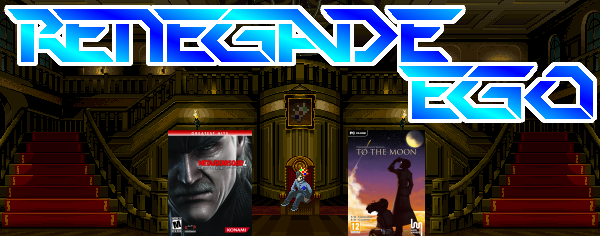
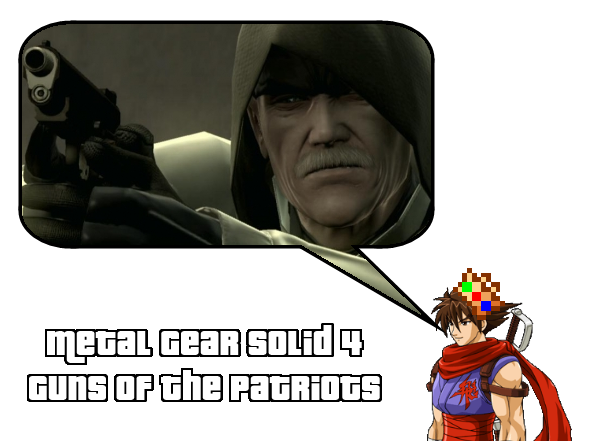
Man, I've been playing a lot of war games recently, haven't I? Valkyria Chronicles, Medal of Honor, Spec Ops: The Line....and now this. Even more surprising is just how diverse my opinions on these games have been. For instance, I'd probably have been harsher on Valkyria Chronicles and its saccharine ilk if its gameplay wasn't absolutely amazing. Then there's Medal of Honor, which was little more than a dick-waving contest with a poor understanding of dick-waving mechanics. Spec Ops: The Line comes next, and while it certainly has important flaws, it also certainly dedicates a lot of energy toward maintaining its horrifying, pointless world.
.....and now this. Where do I even begin? How about with my conclusion: I like this game. Sure, the "game" is about half cutscenes, and it's only barely aware of this sad fact. And sure, the story presented in those cutscenes is confusing and self-indulgent. But deep down, there's ultimately something that makes this game worth playing, even if it is only barely. Could that something be the rewarding stealth gameplay? Who the hell knows?

I'd probably start on that stealth gameplay thing, but I did just say that the game is half cutscene. You can't drop a bomb like that without explaining yourself, can you? But I stand by it: half the game is cinematics, and half of that is utterly needless filler. I'd say that the designers forgot this was a game, but they clearly remembered enough to pander. Unfortunately, that's not going to cut it. Load the game with a bunch of cutscenes, and suddenly, you've created distance from the player. Instead of experiencing things for yourself, you're simply sitting on your ass, watching things unfold in front of you. Sometimes, that's appropriate (like if you're literally supposed to be watching something), but most of the time, the story is simply harder to relate to because of all these cutscenes. Granted, the cinematics are damn fine on their own terms. Whoever directed these scenes clearly knows what elements to highlight, and they very clearly know how to work in some meaningful symbolism. If this were a movie, such technique would be admirable. But this isn't a movie. It's a game, and the cutscenes don't integrate themselves well into that game.
But maybe Guns of the Patriots tells such a good story that it can get away with priding cinematics over direct interaction. (Alright, it can't; you can't ignore gameplay when writing a story for a video game, but let's just run with the premise for now.) If we're judging the game on those merits, then it does....well? It at least does better than it did in the last paragraph. The story is essentially a world hopping fist fight between two decrepit, aging men. Liquid Ocelot (which just has to be a perfume name by now) is trying to take control of The Patriots, and Solid Old Snake is there to stop him. Oh, and tackle a ton of heady themes along the way. Stuff like the commodification of war, trying to maintain autonomy in the digital age, and Snake figuring out his place in the world as an outdated relic. And child soldiers and nanomachines and conspiracy theories and.....maybe the complex plot interferes with those heady themes.
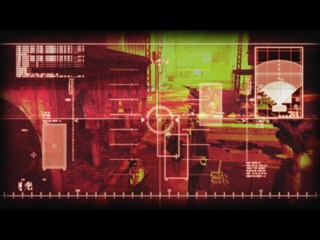
Thankfully, it doesn't interfere enough. The story still knows damn well what it's doing. For instance, let's look at what I said about Snake being old. Yes, it really is that big a part of Metal Gear Solid 4. Half the story's dedicated to people calling Snake an old fart, and the other half is him breaking his hip on a mission. You can't help but feel bad for the guy. Yet in spite of all this, he manages to accomplish a helluva lot over the course of the game. More importantly, though, he accomplishes all of this without ever giving the impression that the writers have pulled anything out of their asses. Everything just feels natural, all the more impressive when there are mooing muscle robots romping about the scenery (more on that in a bit). It's really amazing the level of control that the story maintains throughout the game. And that's just one topic. Imagine what the game does with everything else it wants to cover.
And then the Kojimaisms barge onto the scene to fuck things up. By that, I mean any moment when the game devotes a lot of time toward justifying every last detail of its world, only to populate said world with the dumbest shit imaginable. For instance, Metal Gear Moo. When Metal Gear Moo first came onto the scene, I started getting headaches. I didn't know it at the time, but this was my brain warning me not to put up with any more of this bullshit. My brain was right, as the Kojimaisms kept on rolling. An arms dealer who feeds his diaper-wearing-monkey soda; a little girl who cooks eggs to the tune of obsession; a fucking robot samurai (and everything used to explain his existence); Guns of the Patriots features all of this and so much more. For some reason. I really don't see why any of this was included in the game. They're not consistently entertaining; just jarring. All the Kojimaisms accomplish is to take me out of the experience and render the messages less credible. How am I to take the game seriously on its issues when it can't even take itself seriously? Or maybe that's just me. Maybe you're actually supposed to play the game for the action and sense of spectacle. If that's the case, then yea, I can see all this dumb crap fitting into the story.
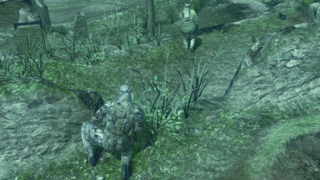
Normally, I'd opt for a broad explanation of the gameplay mechanics, but this time, I think an example will serve me better. Cut to the third act in the game. Snake's taking a sabbatical in Europe, meaning he's trailing a local resistance group to their hideout. If you want Snake to succeed, you're gonna need to put every last bit of your stealth knowledge to good use. Yes, you can tranquilize every idiot in your path and slurp your way into the shadows, but there's so much more you have to do. You have to observe your mark's movements, make sure he doesn't see you, pit the resistance against the army to your advantage, keep track of your surroundings, and so much more.
Does that sound like a lot of work? Well, that's because it is. Unless you're in a wide open area where you can simply blow through enemies undetected, Guns of the Patriots expects a lot of work from you. And time. Let's just say that you're not the only person who's going to spend most of their time sitting on their ass. But you know what? I wouldn't have it any other way. That slowness is precisely why playing through the game feels so good. You've invested so much time and attention into this one minor thing, so it follows that the payoff is going to be even greater. There's almost a predatory aspect to the game; it just feels so empowering, and it all comes together for this great experience. (There might also be something about autonomy and control to tie into the story, but fuck it. Patient gameplay wins out.)
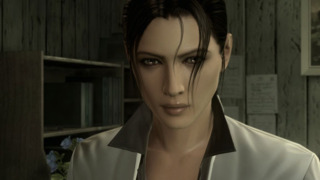
The boss battles, by contrast, damage the experience beyond all belief. They suck. There's no way around it. (The few other bosses are alright, though.) They're too action oriented for the own good. Sure, the game is capable of handling action moments, but it very clearly wasn't meant to. Each boss battle is a clumsy process of finding the Beauty in question and unloading your bullets into her face. Your only hope of finding success is if you stumble across it, not because you're playing as an old man, but more because you're playing through a scenario based on trial and error. And on that note, the bosses don't even have the story to back them up, as they contribute nothing to it. They pop in for a quick boss battle, crawl up and die, have Drebin explain their back-story (all of them pretty much the same), and then fade into irrelevance, never to be heard from again.
I also have some things to say about the weapons systems and the PTSD button and all the bullshit plot twists at the end, but I think I've made my point. In the end, Guns of the Patriots is the kind of game that makes you work for enjoyment. Story-wise, this probably doesn't hold up too well. I can't imagine many people would want to see the game's take on self-determination after learning about the digital conspiracies and psychic computer egg children you have to get through first. Fortunately, this functions better when you're playing the game, largely because the game rewards you this time around. So......great. Another game whose recommendation depends on that whole "game/story" split. Like I haven't played enough of those recently.
Review Synopsis
- Tale as slow as time....Snake far past his prime.....Metal Gear Solid.....
- I don't have any strange Disney jokes for the mechanics. All I can say is that they're as good as ever.
- You know, for a game called Metal Gear Solid 4, the actual Metal Gears really have very little to do with the plot.
Sadly, I was not able to experience Metal Gear Online. However, I feel like this video captures the potential experience quite well.

Another moon-based video game that revolves around emotional item collecting? Sign me the fuck up!......Now that I think about it, I don't need any more elaboration than that. I can just say "Fragile Dreams" and you'll probably understand what my opinion of this game is. Something about emotions, writing, and me pestering the shit out of you to play this damn game.
And it's not just because my glorious Lunar Kingdom plays a big role in the story......OK, that's a pretty big reason. You play as these two memory doctors, but the real focus is on John Wyles, whose life's wish has always been to go to the Moon. Unfortunately, he's a few days away from death, so he'll have to make due with memory alteration so that he believes he went to the Moon.
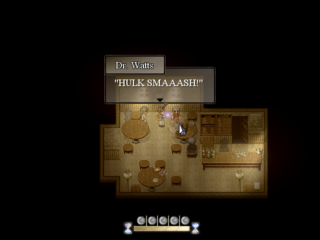
Such a subject brings up some very important ethical concerns, but for whatever reason, none of them are societal. I guess we can ignore serious political ramifications (to name one) if we know that downloading music through your memories is illegal. No, it's all personal for To the Moon. For example, is it right to whitewash a person's history to their liking? What if getting rid of the tragic moments requires getting rid of the joyous ones, too? Is there an obligation to get rid of the tragedy wherever possible? And what about what actually happened? Does altering a person's memory negate the reality of what happened, or is that allowed to stand on its own? Each one of these questions is a complex issue, and fortunately, To the Moon treats each one with the depth and respect they warrant. There are no clear answers; only enough material for you to derive your own.
But that's not what makes the game good; at least not entirely. What makes the game really stand out is its emotional side. I forgot to mention this earlier, but our two doctors (whose names I also forgot to mention) need to create a plausible story leading up to the Moon, and that requires incepting Lunar desires into John's earliest memories. But to get to that point, they have to work backwards from his most recent ones. It's an interesting way of relaying this guy's life story, and more importantly, it works really well. The whole "telling the story backwards" thing creates this feeling of helplessness throughout the story, since you know John can never solve the problems he encounters. You want him to overcome his problems, but given the nature of the plot, you know that's not going to happen (at least in the way you'd want it to happen). This only becomes so much worse when you realize this while the characters are first confronting their problems. And then that becomes worse when you realize that you're playing a video game; a medium known for its interaction. It's amazing how this game can be both heartwarming and heartbreaking at the same time. Of course, backward story telling alone is not responsible for this. The game has other tricks up its sleeve, like how it uses meaningless objects or how it breeds familiarity. Arguably, though, how the plot moves forward is one of the more important ways the game breeds a sense of pathos.
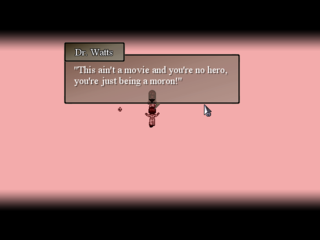
Of course, that sense of pathos takes a serious blow when you realize how selfish John is. For all the time he spends with River (his autistic wife), you never really feel like he gets to know her on a deeply personal level. He doesn't make any strong efforts to know her beyond what she shows him, even when he's presented with a reasonable opportunity. (Anybody who's played the game knows what I'm referring to.) River only seems to exist as an object to fulfill John's desires. Yes, the game blatantly acknowledges this, but that doesn't make it right. If anything, it makes things worse. On some level, John knows what he's doing is wrong.....but he does it, anyway. Given that the story is only good insofar as you sympathize with John, this hampers the quality in a pretty significant way.
I feel at this point, I should probably mention the gameplay. Let's see....well, you wander around small environments, examining items to gain memory orbs you need to advance. You also need to solve simple puzzles to advance, for some reason. They're mildly entertaining, but......do I really need to mention any of this? All these particular mechanics accomplish (besides complementing what I've already discussed) is creating a sense of discovery that closely mirrors what the two doctors most likely feel. In fact, forget everything I said about the mechanics. Just focus on the closely detailed characterization and the emotional investment and all that stuff. Those are the real reasons you should play this game. You know, ignoring the obvious fact that it has the word "Moon" in the title and does justice to my Lunar glory.
Review Synopsis
- Man, does this game know how to bond with its player.
- I just wish the protagonist was less selfish.
- Oh, and something about solving simple "flip all these squares" puzzles.